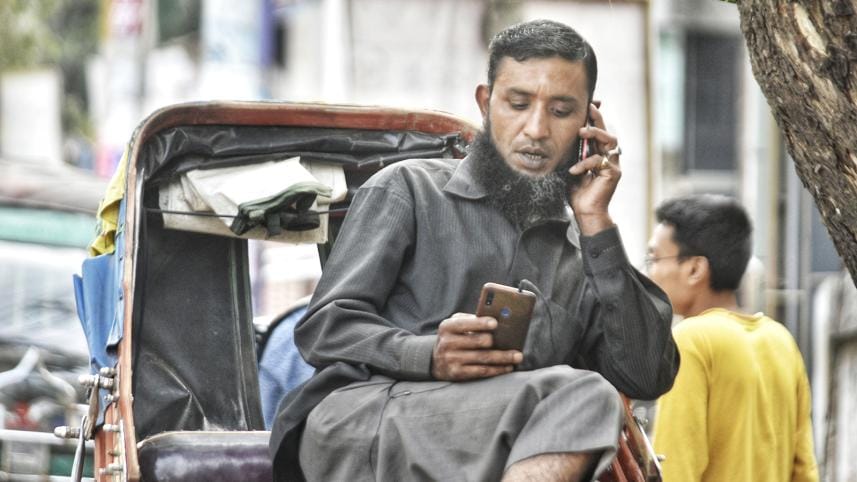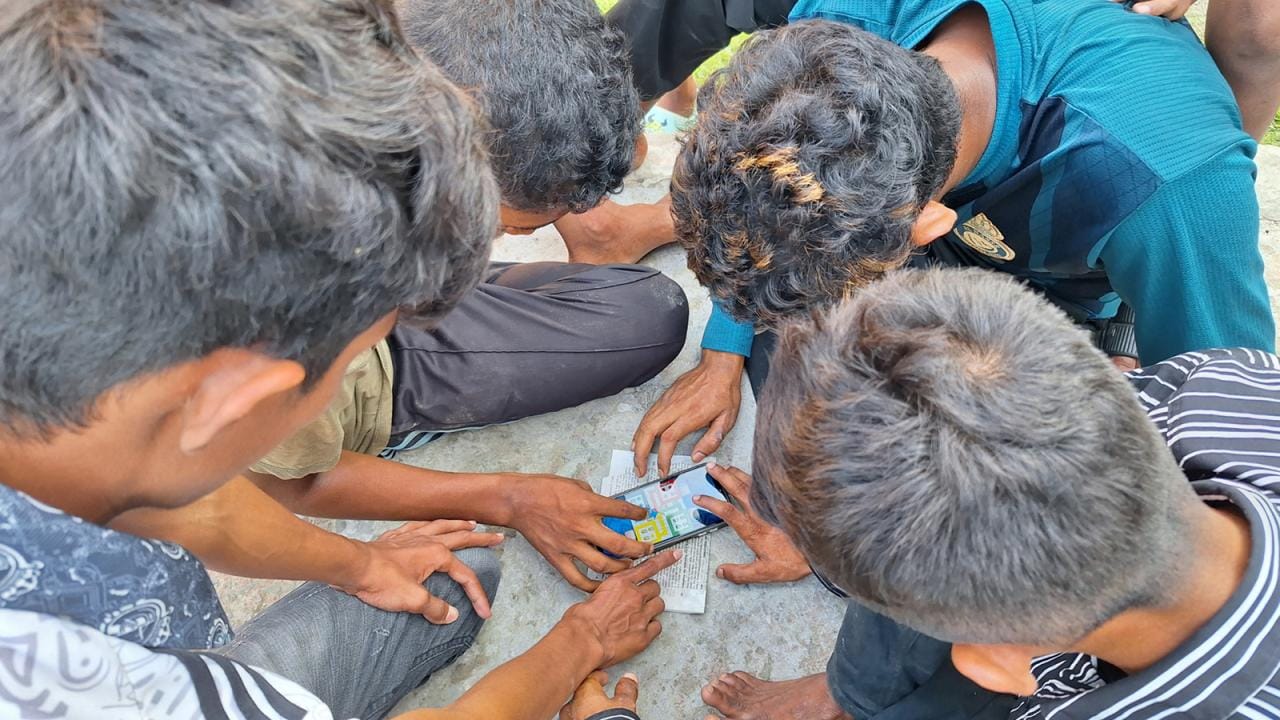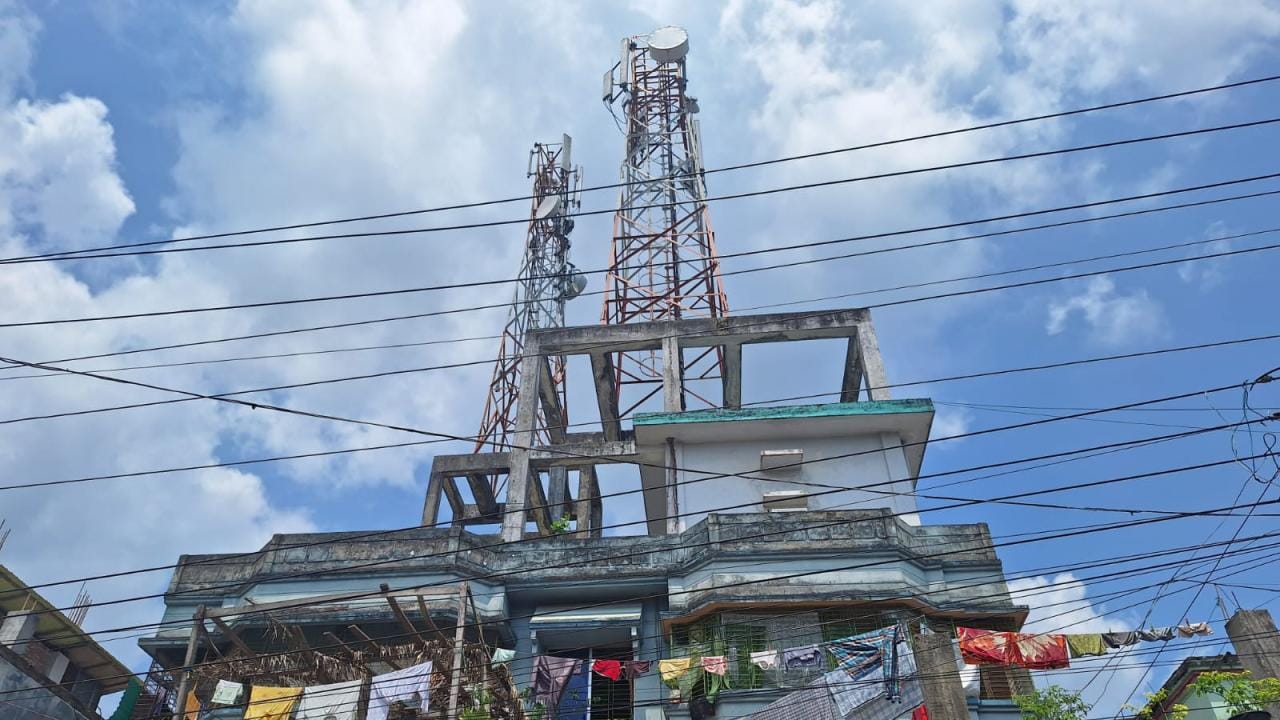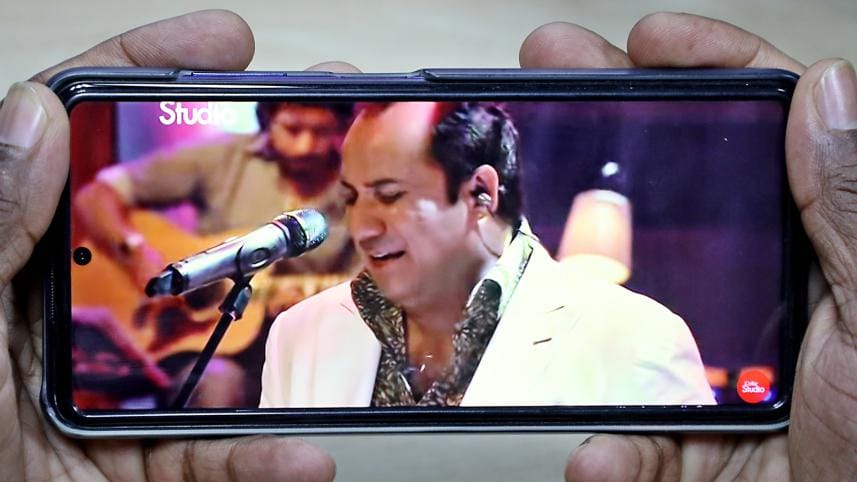Desire for mobile data trumps all else
As one strolls along Green Road or ventures into the depths of Karwan Bazar, he or she may come across a raucous circle formed by labourers, rickshaw-pullers, and street vendors.
All of these individuals have taken time away from their laborious tasks to encircle small screens, usually placed on a mat in the centre of the huddle.
As curiosity drives one close enough to see what exactly they are up to, vibrant colours reflect from the screens onto their transfixed faces, deepening the mystery.
But upon closer inspection, it becomes crystal clear: these men are engaged in one of the oldest and most popular board games in Bangladesh: ludo.

But instead of a board, one dice and the colourful rounded tokens that fans of the games are familiar with, all that is required to play now are smartphones connected to internet.
While that may only be a simple means to unwind at the end of a day of arduous labour, the bustling circle of ludo enthusiasts show how much access to the internet has become a part of daily life.
There are hundreds of such little examples littering the day-to-day lives of the crores residing in Dhaka, all feeding a surge in demand for mobile data.
According to data from the Bangladesh Telecommunication Regulatory Commission (BTRC), there were 10.05 crore people using 4G SIMs as of November 2023. That means 55 percent of mobile users are now using 4G, showcasing a positive trend in the adoption of high-speed mobile internet.
This corresponds to the growing number of internet users in Bangladesh, which has grown exponentially over the past 15 years. There were only 36 lakh internet users in Bangladesh in 2008, but that number ballooned to six crore by 2018. At the end of 2023, the number of internet users nearly doubled to 11.85 crore.
However, the ease of access to the internet also means that people are abandoning traditional voice calls made through telecommunication networks, which incur charges based on minutes, in favour of making calls or video calls through apps.
Even Mustafa Jabbar, a former minister for ICT and telecom, says most of his conversations and messages are made through apps. "A majority of people opt for internet-based calls nowadays. Traditional voice calls only come from those who do not have other means."
He credited the introduction of 4G technology in Bangladesh for the rise, warning: "When 5G will be rolled out, the number of traditional calls will hit rock bottom."
The changing behaviour presents both an opportunity and a challenge to telecom operators. For example, Grameenphone, the largest mobile operator in Bangladesh, saw its data revenue surge 13-fold to Tk 4,542 crore in 2023 from Tk 317 crore in 2013.

Last year, data revenue accounted for 28.6 percent of GP's revenue compared to 19.2 percent in 2018. The revenue for bundle packages, offering data and minutes, stood at Tk 1,920 crore.
Data revenue is even higher for Robi Axiata, which leads the market in the 4G subscriber segment. The second-largest operator's data revenue surged to 40.1 percent of revenues in 2003 from 24.8 percent in 2018.
In the first three quarters of 2023, data revenue contributed 35.1 percent to Banglalink's revenue. In 2018, the third-largest operator's income from the segment was 16 percent.
However, according to officials of the operators, the growth in data revenue is not satisfactory compared to the usage. Mobile data consumption skyrocketed 150-fold between 2015 and 2023 whereas data revenue climbed 10-fold.
They said meeting the rising demand for data requires substantial investment in network infrastructure and this investment can strain operators' financial resources, especially if revenue growth from data services does not keep pace. Besides, acquiring and maintaining spectrum licences for data services is expensive.
The operators had to spend more than $2.15 billion for spectrum in 1,800 band, 2,100 band, 2,300 band, 2,600 band – that are mainly used for delivering data services – in 2021 and 2022.

The gradual decline of call rates
Those now in their fifties can vividly remember a few individuals carrying peculiar devices with antennas, narrow displays, and considerable size.
In the early 1990s, when BTL collaborated with Hong Kong-based mobile operator Hutchison to introduce telecommunications services in Bangladesh, the per minute cost for call was staggering.
"Initially, both callers and receivers incurred charges for calls. Subsequently, the caller bore the cost of Tk 10 per minute," said Nishat Ali Khan, who started working at BTL as a sales executive in 1991.
In 1993, the company was sold and renamed Pacific Bangladesh Telecom Limited (PBTL). It rolled out the brand CityCell Digital to market its products.
The entry of Grameenphone, Robi, and Sheba brought down the per minute price of phone calls to Tk 7. When Banglalink made its foray into the market in the early 2000s, competition intensified and the expansion of mobile network drove down the price.
Today, a one-minute voice call is priced less than Tk 2, and if a customer buys a monthly plan, the cost falls further.

Industry people say traditional voice calls persist in Bangladesh due to the low smartphone penetration, especially in rural areas, where widespread reliance on feature phones and limited internet access ensure their continued relevance.
Although smartphone penetration is witnessing incremental gains, overall, it is still low.
Shahed Alam, head of regulatory affairs at Robi Axiata, said one key reason for the low smartphone penetration is operators are not being allowed to sell phones with their plans.
"Once the government gave us permission to market SIMs, we delivered SIMs to everyone. If we get the consent to distribute smartphones, more people will be able to use such devices."
Yasir Azman, chief executive officer of Grameenphone, in a recent interview, said it is crucial for Bangladesh to boost smartphone penetration.
Nishat Ali Khan pointed out that communicating through mobile phones will never be free.
"Yes, you can talk about tariffs using these apps. Still, you must purchase internet packages for that."
 For all latest news, follow The Daily Star's Google News channel.
For all latest news, follow The Daily Star's Google News channel.
Comments